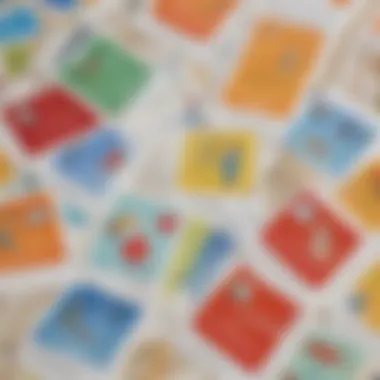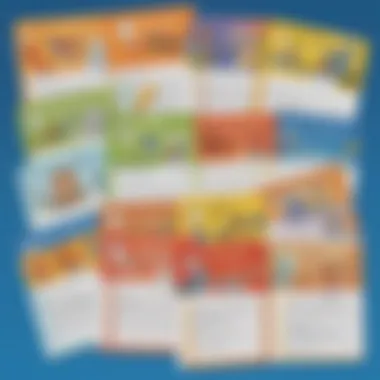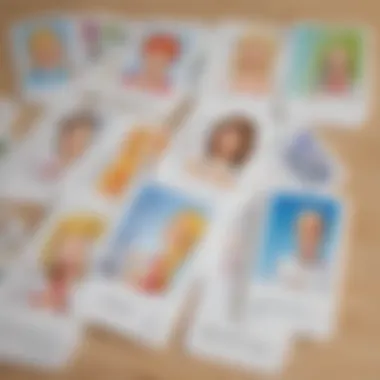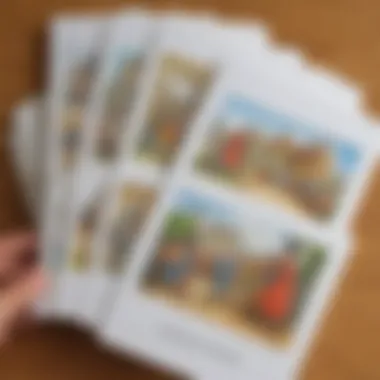Unlocking the Power of Flash Cards: Learn French Effectively


Interactive Learning Games
Explore the world of interactive learning games as a dynamic tool for language acquisition, particularly when learning French. With a myriad of popular games available, such as language puzzles, vocabulary matching games, and pronunciation exercises, these games offer engaging ways to reinforce language skills. Detailed descriptions of top educational games tailored to French learners will be provided, shedding light on their unique features and how they contribute to effective language learning. Moreover, the article will delve into the cognitive benefits of playing these games, emphasizing their role in enhancing kids' cognitive development through stimulating challenges and linguistic immersion. In-depth reviews of selected educational games will be featured, examining the gameplay mechanics and the associated learning outcomes, guiding readers in selecting the most suitable options for their learning needs.
Preamble
In the realm of language acquisition, the resurgence of traditional methods has sparked interest in the age-old practice of utilizing flash cards for learning French. As linguistic enthusiasts and learners seek effective strategies to enhance their proficiency in French, the strategic incorporation of flash cards emerges as a fundamental tool. This article sheds light on the profound impact that flash cards can have on accelerating language learning, offering invaluable insights, tips, and innovative approaches to maximize their utility in the process.
Understanding the Role of Flash Cards in Language Learning
The Science Behind Flash Cards
Flash cards constitute a cornerstone in the realm of memory retention and cognitive processing. The essence of the science behind flash cards lies in their ability to leverage spaced repetition, a cognitive principle emphasizing the reinforcement of knowledge at strategically spaced intervals. This deliberate repetition fosters durable memory retention, aiding learners in internalizing French vocabulary and grammatical structures more effectively. The systematic delivery of information through flash cards optimizes the brain's synaptic connections, facilitating streamlined language acquisition.
How Flash Cards Benefit Language Acquisition
The efficacy of flash cards in language acquisition stems from their capacity to stimulate active recall, a cognitive process proven to enhance long-term retention. By prompting learners to recall information from memory through flash cards, individuals engage in a process known to strengthen neural pathways associated with language processing. Moreover, the self-paced nature of flash card use empowers learners to tailor their study sessions according to their unique learning pace and preferences. This personalized approach fosters a deep understanding of French language nuances and reinforces comprehension through repetitive exposure.
Overview of Learning French with Flash Cards
The Impact of Flash Cards on Vocabulary Expansion
Flash cards serve as potent tools in expanding one's vocabulary repertoire in French. By presenting learners with targeted vocabulary words in isolation, flash cards aid in reinforcing word-meaning associations and contextual understanding. The structured approach of associating words with corresponding images or definitions enhances lexical retention, enabling learners to recall and apply newly acquired vocabulary with precision in diverse linguistic contexts.
Enhancing Grammar Skills Through Flash Cards


Beyond vocabulary enrichment, flash cards play a pivotal role in honing grammar proficiency in French. By encapsulating grammar rules, verb conjugations, and syntactic patterns on flash cards, learners engage in focused practice sessions aimed at refining their grammatical accuracy. The interactive nature of grammar flash cards prompts learners to actively engage with linguistic nuances, facilitating a deeper grasp of French grammar intricacies. Through consistent exposure to grammar-focused flash cards, learners fortify their grammatical foundations and cultivate a nuanced command of the French language.
Creating Effective Flash Cards
In the realm of language learning, the creation of effective flashcards stands as a pivotal element in facilitating comprehension and retention. These tools serve as potent aids in expanding vocabulary, refining grammar skills, and reinforcing language proficiency. Within the context of this article, the focus is on elucidating the essential components that contribute to crafting impactful flashcards for learning French. By delving into meticulous details regarding content selection, design strategies, and technological integration, readers will gain invaluable insights into optimizing their language acquisition journey.
Choosing the Right Content for Your Flash Cards
Selecting Key Vocabulary Words
When it comes to selecting key vocabulary words for flashcards, precision and relevance are paramount. The deliberate curation of core vocabulary not only enhances language comprehension but also accelerates the acquisition process. By honing in on high-frequency words and fundamental linguistic structures, learners can build a robust foundation for linguistic proficiency. The strategic inclusion of key vocabulary words caters to the overarching goal of fostering comprehensive language mastery, making it a strategic and efficient choice for this instructional guide.
Incorporating Phrases and Sentences
Integrating phrases and sentences into flashcards amplifies the contextual understanding of language usage. By encapsulating idiomatic expressions, colloquial phrases, and grammatical structures within flashcards, learners can transcend mere word-to-word translation and grasp the nuances of linguistic expression. The incorporation of phrases and sentences not only aids in language retention but also cultivates fluency and natural language usage. This comprehensive approach to vocabulary acquisition proves to be a prudent and effective strategy for learners aspiring to master the intricacies of the French language.
Designing Engaging and Memorable Flash Cards
Utilizing Visuals and Mnemonics
The utilization of visuals and mnemonics in flashcard design engenders a multisensory learning experience that enhances memory retention. By associating auditory and visual stimuli with language concepts, learners can create lasting cognitive connections that facilitate recall and comprehension. Visual representations coupled with mnemonic devices offer a dual-layered approach to encoding information, making the learning process more engaging and effective. The incorporation of visuals and mnemonics into flashcards paves the way for immersive and memorable language learning sessions, elevating the efficacy of study endeavors.
Formatting and Organizing Information Effectively
Effective formatting and organization of information on flashcards are imperative for optimizing learning outcomes. Structuring content in a clear and logical manner aids in streamlining cognitive processing and understanding. Visual hierarchies, categorizations, and systematic layouts contribute to better information absorption and retrieval. The strategic alignment of content elements within flashcards ensures coherence and facilitates quick reference during study sessions. By focusing on meticulous formatting and organizational methodologies, learners can harness the full potential of flashcards as dynamic learning tools.


Utilizing Technology for Interactive Flash Cards
Exploring Online Tools and Apps
The exploration of online tools and applications revolutionizes the traditional flashcard paradigm, introducing interactive and adaptive learning mechanisms. Online platforms offer diverse features such as spaced repetition algorithms, multimedia integration, and real-time feedback functionalities, enriching the learning experience. By leveraging technology-driven solutions, learners can personalize their study routines, track progress effectively, and access a vast repository of language resources. The integration of online tools and apps into language learning empowers learners to engage with dynamic content, fostering an interactive and stimulating environment for skill enhancement.
Gamifying Flash Card Practice Sessions
The gamification of flashcard practice sessions injects an element of fun and challenge into the language learning process. By incorporating game-like elements such as scoring systems, time constraints, and leaderboard functionalities, learners are motivated to actively participate and retain information. Gamified flashcard practice sessions stimulate cognitive engagement, promote healthy competition, and incentivize regular study habits. This gamification strategy not only enhances motivation and retention but also infuses a sense of enjoyment and accomplishment into the language learning journey, making it an innovative and compelling approach for learners seeking interactive and effective study methods.
Maximizing the Use of Flash Cards for French Learning
In the realm of French language learning, the significance of maximizing the use of flash cards cannot be overstated. By incorporating carefully crafted flash cards into your study routine, you open doors to a plethora of benefits that enhance vocabulary retention and grammar proficiency. The art of utilizing flash cards effectively lies in creating engaging practice sessions and integrating them seamlessly with other language learning strategies. Whether you aim to bolster your French skills or delve into the intricacies of the language, a strategic approach to using flash cards can truly elevate your learning journey.
Incorporating Flash Cards into Your Study Routine
Creating Daily Practice Sessions:
When it comes to mastering French with flash cards, the regularity of daily practice sessions plays a pivotal role. By immersing yourself in short, focused study periods every day, you establish a strong foundation for long-term retention and application of language concepts. The inherent beauty of daily practice sessions lies in their ability to instill discipline and consistency in your learning routine. Embracing this structured approach not only solidifies your grasp of vocabulary and grammar but also cultivates a sense of confidence and familiarity with the French language.
Integrating Flash Cards with Other Learning Strategies:
To truly maximize the potential of flash cards in French learning, it is essential to integrate them seamlessly with other proven learning methods. By combining the visual and interactive nature of flash cards with complementary strategies such as listening practice or conversational exercises, you create a multi-dimensional learning experience that caters to various aspects of language acquisition. This integration enhances your overall language proficiency while keeping your study sessions dynamic and engaging. By synergizing flash cards with diverse learning approaches, you pave the way for a comprehensive and well-rounded language learning journey.
Monitoring Progress and Adjusting Your Flash Card Strategy


Evaluating Retention and Recall Rates:
An integral component of maximizing the use of flash cards is the ongoing evaluation of your retention and recall rates. By regularly assessing how well you remember the information on your flash cards, you gain valuable insights into your learning progress. Evaluating retention and recall rates allows you to identify areas of strength and areas that require further reinforcement, enabling you to adjust your study approach accordingly. This self-assessment empowers you to tailor your flash card strategy to suit your individual learning style and optimize your French language learning outcomes.
Adapting Flash Cards to Address Weaknesses:
Flexibility is key when it comes to leveraging flash cards effectively for French learning. Adapting your flash cards to address specific weaknesses or challenging areas consolidates your understanding and accelerates your language acquisition. Whether you need to focus on particular grammar rules, pronunciation nuances, or complex vocabulary, customizing your flash cards to target these areas ensures targeted remediation and improvement. By embracing adaptation as a core strategy, you fine-tune your learning process and overcome obstacles with precision and efficiency.
Collaborating with Peers for Interactive Flash Card Activities
Organizing Group Study Sessions:
Engaging in collaborative learning through group study sessions brings a dynamic dimension to your flash card practice. By organizing sessions with peers, you exchange insights, share learning strategies, and challenge each other in a supportive environment. Group study sessions foster a sense of community and camaraderie, making your French learning journey not only educational but also interactive and engaging. Leveraging the collective knowledge and experiences of your peers enhances your comprehension and builds a sense of camaraderie around language learning.
Engaging in Peer Quiz Challenges:
Adding a playful yet competitive element to your French learning, peer quiz challenges inject excitement and motivation into your study routine. By testing each other's knowledge using flash cards, you stimulate active recall, reinforce learning concepts, and elevate your overall engagement with the language. Peer quiz challenges create a fun and challenging atmosphere where you can assess your progress, celebrate achievements, and identify areas for improvement collaboratively. Embracing the interactive nature of peer quiz challenges energizes your study sessions and fosters a spirit of friendly competition that bolsters your learning experience.
Epilogue
In grasping the full extent of how flash cards can revolutionize the learning process of the French language, it becomes evident that their significance extends far beyond mere study aids. The fundamental role of flashcards lies in their ability to condense complex linguistic concepts into bite-sized, digestible portions that facilitate efficient retention and comprehension. By systematically categorizing vocabulary words and grammatical structures on flashcards, learners can incrementally build a solid foundation of language knowledge. This methodical approach not only enhances vocabulary expansion but also sharpens grammatical accuracy, thereby fostering a comprehensive understanding of the French language.
Embracing the Efficiency of Flash Cards in French Language Learning
Recap of Benefits and Best Practices:
Diving into the realm of recapitulating benefits and best practices associated with utilizing flashcards for French language acquisition, it is crucial to highlight their unparalleled effectiveness in reinforcing memorization. Through regular exposure to targeted vocabulary and grammatical patterns, flashcards serve as catalysts for long-term memory retention. The repetitive nature of reviewing flashcards enhances cognitive recall, enabling learners to effortlessly retrieve linguistic information during real-world communication. Furthermore, the strategic selection of key words and phrases ensures a focused learning experience, optimizing the efficiency of study sessions. In essence, the systematic integration of flashcards into language learning routines cultivates a strong linguistic foundation and nurtures meaningful progress in French proficiency.
Inspiring Continued Exploration and Innovation:
Exploring the realm of inspiring continued exploration and innovation elucidates a pivotal aspect of leveraging flashcards for French language mastery. By encouraging learners to engage in creative approaches to card design and content organization, the process of learning transcends traditional boundaries. Embracing a spirit of innovation fosters dynamic learning experiences, motivating individuals to explore unconventional mnemonic devices and multi-sensory learning techniques. This adaptive mindset not only instills a sense of curiosity and intellectual curiosity but also nurtures a passion for ongoing self-improvement. Embracing innovation in flashcard utilization propels learners towards mastering the intricacies of the French language with zeal and ingenuity, thereby opening doors to endless linguistic possibilities.















